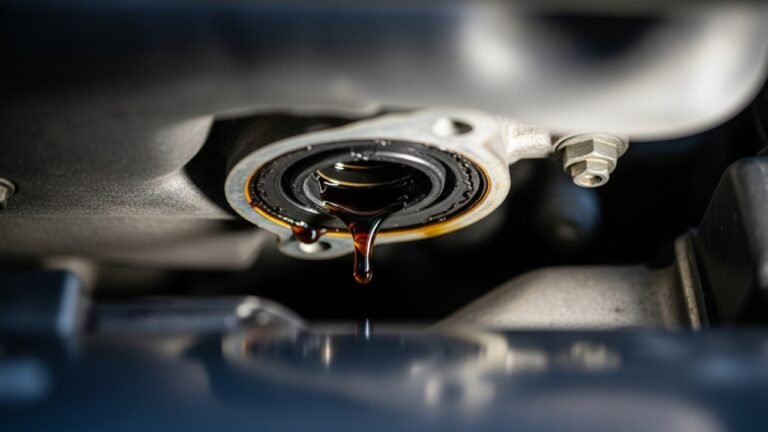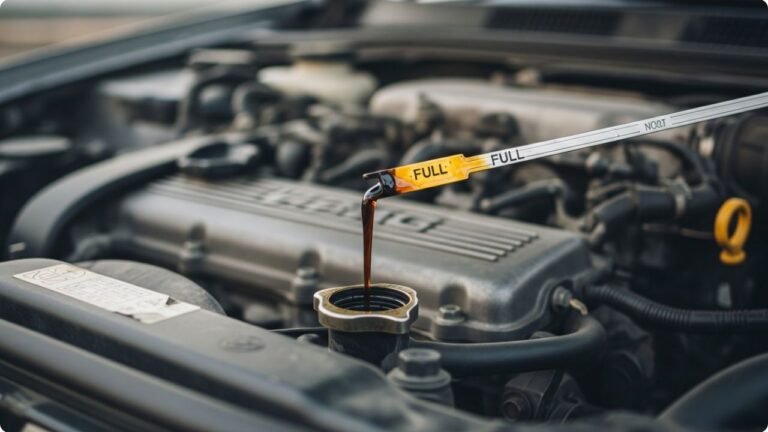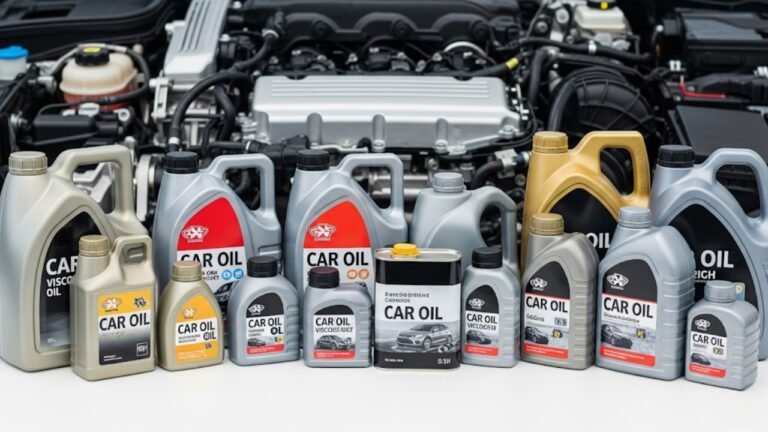Does My Car Need Synthetic Oil? A Friendly Guide

Ever stood in front of rows of engine oil bottles and wondered, “Does my car need synthetic oil?” You’re not alone. I remember the first time I was told at a service center, “Ma’am, your car needs fully synthetic oil.” My response? A blank stare followed by, “Is that good?” That little moment sparked a curious journey through owner’s manuals, forums, and conversations with mechanics that I’ll never forget.
Oil might seem like a simple fluid. But it’s your engine’s lifeline—the quiet protector inside, battling heat, friction, and wear day in and day out. Yet with so many choices—conventional, semi-synthetic, full synthetic—it’s easy to feel lost.
In this friendly, detailed guide, we’ll break it down together. We’ll look at what synthetic oil is, why some cars need it (while others don’t), and how to tell what’s best for your beloved ride.
What Exactly Is Synthetic Oil?
Let’s start with the basics. You’ve probably heard of conventional oil—the classic, derived-from-crude version that’s been around for decades. Synthetic oil, on the other hand, is like the smart, athletic cousin.
It’s man-made in labs, engineered to have molecules of uniform size and shape. Think of it like a custom-tailored suit versus something off-the-rack. Synthetic oils often include advanced additives that help reduce wear, fight deposits, and stay slick even under high temperatures.
Here’s a quick comparison table to give you a visual sense:
| Feature | Conventional Oil | Synthetic Oil |
|---|---|---|
| Source | Refined crude oil | Lab-synthesized base oil |
| Temperature Resistance | Lower | Higher |
| Longevity | 3,000–5,000 miles | 7,500–15,000 miles |
| Cost | Lower | Higher |
| Engine Cleanliness | Average | Superior |
| Wear Protection | Basic | Advanced |
So, when you ask, “Does my car need synthetic oil?”, you’re really asking if your engine needs that extra level of protection.
Why Some Cars Need Synthetic Oil (And Others Just Don’t)
Here’s a personal story.
A friend of mine, Hossain, drives a turbocharged Audi. On his last oil change, he tried to save some cash and switched to conventional oil. Two months later, his check engine light came on, and guess what? Sludge buildup.
High-performance engines—especially turbocharged, supercharged, or high-compression ones—require synthetic oil. These engines run hotter and harder. Synthetic oil stays stable, doesn’t break down easily, and flows better in cold starts.
Your owner’s manual will usually spell it out. If it says “synthetic required”, there’s no wiggle room.
However, if you drive a basic commuter car—say, a Toyota Corolla—you may not need synthetic. But even then, there are benefits.
Here’s when synthetic is essential:
- You drive in extreme temperatures (very hot or very cold).
- Your engine is turbocharged or supercharged.
- You tow heavy loads or go on long trips often.
- You want to go longer between oil changes.
- Your manufacturer requires it.
The Subtle Signs: How to Know What Your Car Really Needs
So you’re wondering, “Does my car need synthetic oil or is it just hype?” Here’s how you can find out:
1. Check the Manual
This is the most reliable source. Flip to the maintenance or oil section and look for phrases like:
- “Requires synthetic oil”
- “Recommended: SAE 5W-30 full synthetic”
2. Look at the Engine Type
Engines that are newer, more complex, or performance-tuned generally require synthetic oil.
3. Talk to a Mechanic
Sometimes, manuals can be vague. A good mechanic can take one look under the hood and tell you what will keep your engine happiest.
4. Evaluate Your Driving Habits
If you take short trips, start and stop a lot, or drive in heavy traffic, synthetic oil helps reduce stress on the engine.
Real Talk: Is It Worth the Extra Cost?
Synthetic oil can cost double or even triple the price of conventional oil. But it lasts two to three times longer.
Let’s crunch a simple example.
- Conventional oil change: $40, every 4,000 miles.
- Synthetic oil change: $70, every 10,000 miles.
Over 20,000 miles:
- Conventional: 5 oil changes = $200
- Synthetic: 2 oil changes = $140
Surprise! You might actually save money in the long run.
Not to mention the savings on engine repairs and improved fuel economy that many drivers report.
The Emotional Side: Peace of Mind on the Road
Driving is deeply personal. Whether it’s a quick school run or a cross-country journey, we rely on our cars to show up, every time. That’s why I switched to full synthetic oil years ago.
I still remember a long drive to Sylhet through heat, traffic, and hilly roads. Halfway through, a friend’s car started overheating. Mine? Cool as a cucumber. I smiled and thought, “Worth every penny.”
With synthetic oil, you’re buying peace of mind. It’s like choosing bottled water in an unfamiliar city—it’s not just about cost. It’s about trust.
Key Benefits of Using Synthetic Oil (Even If Not Required)
- Better Protection: Especially at high RPMs or temperatures.
- Cleaner Engine: Fewer deposits = smoother performance.
- Less Frequent Changes: Saves time and hassle.
- Improved Fuel Efficiency: Less friction = more miles per liter.
- Cold Start Performance: Flows instantly, even on frosty mornings.
Myths vs Facts: Cutting Through the Engine Oil Confusion
When you start talking to people about synthetic oil, you’ll hear a lot of myths—some believable, some downright bizarre. Let’s clear them up with a touch of truth and logic.
Myth 1: You Can’t Switch to Synthetic in an Older Car
Fact: You absolutely can. Unless your engine is leaking or burning oil, switching to synthetic is safe. It may even help by reducing sludge.
Myth 2: Synthetic Oil Causes Leaks
Fact: This myth comes from the early days of synthetic oil. Today’s formulas are compatible with modern gaskets and seals. They don’t cause leaks—but they may reveal ones that were already there.
Myth 3: Synthetic Oil Is Always Better
Fact: It depends on your car, budget, and driving conditions. For some people, the extra cost isn’t worth it. For others, it’s a no-brainer.
Myth 4: All Synthetic Oils Are the Same
Fact: Not all synthetic oils are created equal. Some are full synthetic, others are synthetic blends. Always look for trusted brands and API/SAE certifications.
Can I Mix Synthetic and Conventional Oil?
Another common question—especially when people are between oil changes or doing a top-up.
The honest answer? Yes, you can mix them.
But should you? Not really. Mixing conventional with synthetic reduces the performance benefits of the synthetic part. If you’re in a bind, it’s fine. Just don’t make it a habit.
Switching to Synthetic: How to Do It Smoothly
If you’re ready to make the switch, here’s a simple path to follow:
Step 1: Consult Your Manual
Double-check if synthetic is allowed or recommended. Even if it’s not required, that green light helps.
Step 2: Do a Complete Oil Change
Don’t just top it off. Drain the old oil, replace the filter, and start fresh.
Step 3: Use a Reputable Brand
Stick to names like Mobil 1, Valvoline, Castrol, or Shell. Look for certifications like API SN Plus or ILSAC GF-6.
Step 4: Monitor Oil Levels and Color
After the first change, check your dipstick regularly. Make sure there are no leaks or unusual drops in level.
Step 5: Enjoy Longer Gaps Between Changes
Welcome to a life with fewer oil change appointments!
When Synthetic Is a Must: Some Special Scenarios
Beyond what the manual says, there are certain life situations where synthetic oil isn’t optional—it’s smart.
Long-Distance Drivers
If you clock 20,000–30,000 km a year, full synthetic oil gives you longer intervals, better fuel economy, and fewer chances of engine stress.
Desert or Tropical Heat
Living in Dhaka, or traveling to places like Chattogram or Rajshahi, means heat. Real heat. And synthetic oil doesn’t thin out under that pressure.
Cold Mornings
If you’re in the hill tracts or traveling north in winter, synthetic oil flows better when cold. Your engine will thank you with smoother starts.
Heavy Loads
Got a pickup, or tow trailers, or carry tools for work? Synthetic oil will help your engine handle that extra burden without complaint.
FAQs: Quick Answers to Common Questions
1. Does my car need synthetic oil if I barely drive it?
Yes, especially if those trips are short. Engine oil degrades with time, not just distance. Synthetic resists this better.
2. Is synthetic oil really worth the cost?
If your car needs it—yes, absolutely. Even if it doesn’t, the long-term benefits in protection and fewer oil changes can make it a wise choice.
3. How often should I change synthetic oil?
Every 7,500 to 15,000 miles, depending on your driving habits and the oil brand.
4. Can synthetic oil improve fuel economy?
Yes, many drivers report better mileage. The oil reduces internal friction, allowing smoother engine operation.
5. Is synthetic oil better for high-mileage cars?
Yes—especially high-mileage formulas. They include seal conditioners and additives that help older engines stay tight and efficient.
6. Can I switch back to conventional oil later?
You can. But once you enjoy the benefits of synthetic, chances are you won’t want to go back.
7. What happens if I ignore the manual and use conventional oil instead of synthetic?
In some engines, it may void your warranty, cause sludge buildup, or result in faster engine wear.
Closing Thoughts: What Would I Do If I Were You?
Here’s the thing. I’m not a mechanic. I’m just someone who’s driven beaters, sedans, SUVs, and even a classic ‘80s hatchback. I’ve driven through Bangladesh’s monsoon floods, and across dry village roads. And here’s what I’ve learned.
If your car requires synthetic oil, don’t compromise. It’s not worth the engine damage.
If your car recommends it, seriously consider it—it’s like giving your engine a VIP ticket to longevity.
If your car doesn’t need it, weigh the benefits. Peace of mind, fewer oil changes, and smoother performance are hard to ignore.
Sometimes, we spend big on accessories—tinted windows, sound systems, even fancy seat covers—but skip what truly matters inside the engine. Trust me—a healthy engine is the best upgrade you can invest in.






